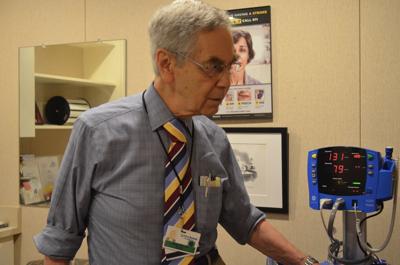If you live in South Carolina, you're more likely to end up in the hospital with a circulatory system disease – such as heart attack or stroke – than a serious injury.
This information comes from the Department of Health and Environmental Control's summary of a 2018 report on the state's health issues. The report, South Carolina Health at a Glance, is being summarized by the department in a series of blog posts at scdhec.gov.
Circulatory system diseases, which include heart disease and stroke, are by far the leading cause of hospitalizations in South Carolina. Heart disease is the second-leading cause of death in the state, just behind cancer, and stroke is the fifth-leading cause of death.
To medical professionals at Aiken Regional Medical Centers, these statistics are no surprise.
The stroke belt
"This is the stroke belt – Southeastern United States – and South Carolina used to be called the buckle of the stroke belt, because we had the highest incidents of stroke," said Attending Neurologist Melvyn Haas.
Haas has practiced medicine for more than 40 years. In that time, he has seen the medical science behind treating strokes improve by leaps and bounds. He has also witnessed how easy it can be for people to miss the signs of stroke and has even lost a good friend to the illness.
"He was a smoker, and he had sudden loss of vision in one eye," Haas said. "He saw an optometrist … Shortly after, he became paralyzed on one side."
Haas said it can be difficult for the "brain to report on itself" once someone begins to suffer a stroke. There can be a wide variety of symptoms, such as vision loss, paralysis, dizziness or speech problems. Strokes that cause issues in the right hemisphere of the brain can even trigger feelings of denial in a patient.
"More people fear disability more than death, so they don’t want to have a stroke," Haas said.
Several lifestyle factors, which can be more prevalent in Southern states, lead to stroke.
"The number one (cause) is hypertension – high blood pressure," Haas said. "Number two is smoking, and we have a lot of that in South Carolina. Diabetes is a contributing factor, and obesity – we have a lot of obese people.
"Most of it is, people in South Carolina don’t take care of their health," he continued.
Haas said anyone who has already experienced a stroke is exponentially more likely to experience stroke again.
Racial differences can play a key role in who is affected by stroke. Haas said African Americans are more likely to suffer strokes than Caucasians or Hispanics.
"African Americans – they don’t tolerate hypertension as well as other races," Haas said. "Africa’s a sodium-low content, so people that evolved in Africa had kidneys that retain sodium. Then they were brought to America, and America’s a sodium-rich continent."
Although strokes can be devastating, Haas said immediate treatment can help reverse or limit the consequences. The most important thing is to call a hospital – not a primary care doctor – and seek help.
Haas encourages patients to use an ambulance, because they are more likely to be seen by a physician immediately. However, if patients must be driven to a hospital, they cannot wait to be seen.
"There are people who will quietly sign in, and then go sit down and the patients will complete their stroke in the patient room," Haas said.
He said to announce clearly to staff if someone is suffering from or may be suffering from a stroke. Aiken Regional has an accredited stroke center that can stabilize most stroke patients.
The No. 1 killer of Americans
In addition to stroke, heart disease is another circulatory illness that is devastating to most races in the United States. It is the leading cause of death of Americans.
"We are in the heart of the stroke and heart attack belt," said Benjamin Lanham, Aiken Regional's Stroke and Chest Pain Coordinator. "Over half a million people in the U.S. suffer their first heart attack each year."
Lanham said, due to the nature of these types of circulatory system diseases, there aren't many early warning signs before they occur. Managing "modifiable risk factors" is the best way to prevent both stroke or heart attack from occurring.
Heart disease, like strokes, can sometimes be difficult for patients to identify. Symptoms of heart attacks can vary strongly between men and women.
Prevention, Lanham said, is key.
"Tobacco cessation is the single best health decision a person can make," Lanham said. "After that, engaging in physical activity several times a week and eating a heart-healthy, well balanced diet."
Aiken Regional has two cardiac catheterization labs and five interventional cardiologists to treat heart problems.



